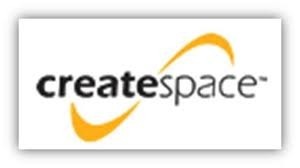M.G. Harris's Blog, page 4
May 25, 2012
The self-publishing experiment part 5: Pricing of indie-published POD and ebooks
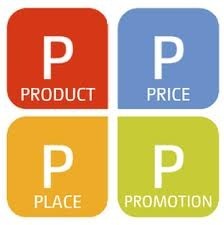
Price, Price, baby.
When you go to marketing school they teach you about the ’marketing mix’, a.k.a the 4 Ps: Price, Promotion, Product, Place.
As an indie-published author, you can’t compete with the big marketing cash of a major promotion that a publisher might give. On the other hand, you have fewer mouths to feed in your own publishing chain. By charging much less than a traditional publisher for a digital product, you can make the same royalty as you might via trad publishing, selling far fewer copies.
By lowering the price barrier, you can hope to achieve the quick-buy reaction that only a great author brand OR terrific (often expensive) marketing can achieve with a book priced around $7.
This is proven, btw, by the 149+ (at the time of posting this!) self-published authors who have now sold more than 50,000 ebooks, also by the fact that in a few cases, these authors were previously unknown. (i.e. they were not not Joe Konrath, with eight traditionally-published books, or Barry Eisler, a New York Times best-selling author).
Price, therefore, is the indie-publishers’ ace-in-the-hole.
(N.B. This doesn’t mean that people will actually read your book. For that, there’s nothing like word of mouth. It’s the Holy Grail of book-selling and darned expensive and/or labour intensive to achieve. If you think that word of mouth ‘just happens’, read this article about the heroic efforts of Scholastic USA to promote The Hunger Games back when it was just a manuscript.)
So what’s a good price?
A good rule of thumb, I find, is to price your paperback to deliver a royalty as close as possible to what you make for a traditionally published MMP, i.e. 7.5%x7.99=60p = roughly $1 (US).
If you use Createspace you can probably price your POD paperback close to the normal price a similar book published in trad paperback format, and make close to your dollar, distributing at Amazon.com and the five Amazons in Europe.
If you use Lightning Source, you’ll need to factor in a discount of at least 35% for retailers (realistically more – most publishers offer up to 60%). In practice, this means that your US version may be more expensive than a similar book published in trad paperback format. Australian books prices are fairly high, so you might just be able to make your royalty whilst setting close to a market price.
The main thing, I think, is not to be greedy. Keep the product as affordable as possible. One day POD books may be cheaper. When that day comes, indie-publishers can compete a little more effectively. For now though, print remains the domain of the traditional publisher.
So don’t sweat it. Do what you need to make your book available in print, if that’s what you’ve decided to put in your product mix. A book that’s also available in print may look like a more complete product via the online retailer.
Pricing the ebooks is a whole other game. A complex issue indeed! Here are some articles you should read before deciding.
Joe Konrath on ebook pricing (Sept 2010)
It’s hard to figure out pricing for ebooks from anecdotal evidence (April 2011)
How to Price an Ebook for Indie Authors, 5 Best Ebook Prices (July 2011)
I decided to go in with a 99p promotional price for THE DESCENDANT ebook, and mix in some freebie days that are offered as part of the KDP Select Program.
The Createspace version (on sale exclusively at Amazon US, UK, DE, FR, ES, IT) is a competitive $9.99. The LSI version is a competitive at £7.99 in the UK (the same as a Joshua Files book) and $11.99 in the USA, but booksellers are free to discount it since they buy it at a discount. The LSI version in Australia is $16.99, which is actually less than I paid for a copy of ZERO MOMENT in a Melbourne Borders in 2011.
With THE DESCENDANT aim isn’t primarily to make money but to build a new digital readership, and to attract readers to my traditionally-published novels. They retail at a far higher price so a low-cost introduction to my writing will hopefully serve as a nice enticement.
Next: #6: Materials and Methods
May 23, 2012
The self-publishing experiment part 4: Design and Decisions: Which POD (print-on-demand) people?
 With so many decisions to make, it’s a relief when one is made for you. Digital version or not?
With so many decisions to make, it’s a relief when one is made for you. Digital version or not?
OF COURSE. It’s only the advent of digital that makes it possible to gain a wide-enough readership to recoup the cost and effort of self-publishing.
Successful self-publishing is all about the ebook.
However – to print or not to print, that is the question.The successfully self-published author Catherine Ryan Howard (of Catherine, Caffeinated fame) sold her ebooks at a 11:1 ratio to her print book.Afterwards she wondered whether it’s worth doing a print version at all. In the end, it may not be worth the effort and cash, but for some other considerations.To Catherine’s most business-critical consideration, I will add TWO more.
Catherine raised this one – print versions are best for getting reviews. Reviewers enjoy hard copies; it’s s small gift that appreciates the time and effort of their review. Even if they can’t store everything they receive, the books can be found a good home. Think of it as a marketing cost.
Print versions are inclusive. Most people don’t have ereaders. The Joshua Files have sold in seventeen language territories and are read mainly by teenagers. Even though THE DESCENDANT is an older readers’ book, it’s perfectly accessible to anyone with GCSE-level science and has less violence and sex than some YA books (more science though). I don’t wish to exclude those readers. So that’s a plus for a print version.
When people browse the Kindle/Nook stores, a novel that doesn’t also have a print edition is a dead-giveaway as a self-published book. Not that there’s anything wrong with that, to borrow a phrase from Seinfeld. If you want to do the job as professionally as possible then, a print version is worth the investment.
It’s hard to make more than $1 US on a POD book in the cheaply-priced book markets of the UK and USA. In Australia and much of the EU, books are more expensive and rarely discounted, so you can do better, quite easily up to $2 US. Bricks-and-mortar book stores are unlikely to order a POD book unless you allow returns – a potentially costly strategy. However, with the growth in online retail of print books, your print edition, making you a neat dollar on most sales, might bring in a healthy trickle of sales. It’ll cost you upwards of $500 USD extra to make available a print edition, plus all the extra work with Nielsen/Bowker.
For my established readership, it’s essential. If you’re new to publishing, it may be best to start with ebook only and see what happens.
The reality is that without a sales force to get your book into all the high street stores, a promotion (such as 3-for-2 or other discount at a major retailer – all The Joshua Files books have benefited from these) print media coverage, advertising and a fancy/textured/foil cover to attract attention etc: in other words, without all those things that Anthony Horowitz’s publisher described as “peripherals“, then your print books won’t shift enough to make real money.
The print version is a loss leader for a self-publisher; a marketing tool. Using loss leaders makes your marketing strategy more aggressive. It reduces one more potential buyer-objection: ‘if this book is so good, why isn’t there a print version?’.
The more interesting question is how to print.
Catherine Ryan Howard is the expert here: read her blog or her book Self-Printed for the full story.
Here’s a very quick summary of the state of play at the time I made my decision.
The two main print-on-demand suppliers of the moment are Createspace (part of Amazon) and Lightning Source (part of Ingrams). Createspace are good, easy to use, will deal with individuals not just companies BUT they are in the USA. UK customers will face steeper shipping charges if they order via Amazon.com. Lightning Source are more old-skool printers set up to deal with corporates, and you need to have your own company to use them. However, if you want your books to be available as POD via other retailers including in the UK, Lightning Source is the current best bet.
The business and economics of the Createspace vs Lightning Source decision are not simple. I read a 99c ebook on the subject, which is short and worth a look.
In the end I decided to go with BOTH. Two editions of the book – one for sale only via Amazon.com printed by Createspace (the US edition). And one for sale via any retailer that chooses to order from the Ingrams catalogue (the UK edition).
However, pricing a paperback at a realistic level (for the market) is often incompatible with making a profit. It might be worth a whole blog post on pricing.
In summary, that is a total of three editions; ebook, Createspace - and Lightning Source -printed.
Remember – POD is your loss leader.
For me, it is key to have the book available in print, and priced to the bone, because I am doing this for my readers. I want existing readers to be able to enjoy another story, and I’d love to introduce new, older readers to the twisty, often complex plots of The Joshua Files.
Next: #5 Pricing of indie-published POD and ebooks - Pricing. It’s a self-publisher’s most significant marketing ‘P’ word. What to do?
May 21, 2012
The self-publishing experiment part 3: Designing the experiment

Good old ALCS. Thanks for the bootstrap finance!
Question: How much work does it take to write a self-published book?
Answer: about as much as for a traditionally published books
The first part of any experiment, and in many ways the most enjoyable part, is the experimental design.
I love to design experiments. It’s the beautiful phase, where everything is theoretical, and in your head, everything works. That’s some time before you spill radioactive isotopes in the water bath and incur the wrath of the entire lab.
Even executing the experiment isn’t too bad. It’s the eventual failure of most of them that makes science so hard. Starting out, you know that the experiment will almost certainly fail; either at the pathetic stage of not actually working, because you need better reagents, or at the heart-breaking stage where it worked, but the answer was NO.
No, that is not how I, Nature work. Try again. Or give up. Who cares, puny scientist? For lo, I am Nature.
Remember that – the answer is very often NO. If you can fully accept this setting out and still work hard, stay positive and concentrate on all the details, then you have much of what it takes to be a scientist.
The experimental question is this:
Can a modestly successful, internationally-published author (but not a ‘household name’), produce a quality product that will engage existing and new readers and make the author more money than if the manuscript had been sold for a modest advance?
(N.B. It’s important to stress that whatever the results of the experiment, certain extrapolations will always be invalid. Failure won’t mean that all self-published authors will fail. Success won’t mean the end of traditional publishing. Success/failure can’t even be successfully applied to MY next project. Once in a while an author has a runaway success. More frequently we provide a regular drip of content, slowly building an audience. I’m guessing that I’ll be in the latter category. This isn’t pessimism, just an acknowledgement of the balance of probabilities.)
Let’s say that I might have been able to get £5k for this manuscript. (Given that THE DESCENDANT is an adult novel set in the world of a YA book series, a sale would have been impossible via my own publisher, since Scholastic only publish children’s books, but let’s just use £5k as a representative advance).
My ALCS & PLR fund is about £2,000 this year. I’m a strong believer in bootstrap finance for start-ups, so this means I can use this as surplus profit from The Joshua Files to be invested in my imprint.
£2,000 is the total cash budget. So the book needs to make £7,000 for me to break-even including an opportunity cost*. (but only £2K to recoup the cash.)
Designing this self-publishing experiment, I asked myself a few questions:
Which formats should I produce? ebook only? Enrol in Kindle Select? Make a print version too? POD or short-run offset print?
Availability of any print edition – make available for sale in the UK and US? Or just one of the two?
What kind of revenue model are we looking at? How many copies need to sell at what price to recoup the cash investment?
Marketing – how much to spend and how?
The one thing I never had to consider was this – would I hire an editor.
OF COURSE. No question. Not only that but I’d substantially rewrite the original manuscript, which was the first thing I’d written since my days of Blake’s 7 fan fiction. The manuscript couldn’t be structurally edited too severely, because the Joshua Files mythology and the details of the Alternate Reality Game rest on many elements in THE DESCENDANT.
But edited as much as the manuscript could take? Hell, yeah! The first thing I did was to spend six weeks rewriting the 2005-version of the script.
My accomplice in this was, I’m delighted to say, the experienced senior children’s book editor, Polly Nolan. Polly and I worked together on ZERO MOMENT and DARK PARALLEL while Polly was Editorial Director of Fiction at Scholastic Children’s Books, UK. When I told Polly my plan to publish THE DESCENDANT, she was incredibly supportive and agreed to take the project on. I couldn’t quite afford the three rounds of editing I’d had with all the Joshua Files books, but I knew Polly well enough to know that if the manuscript isn’t too structurally flawed, she can do most of the job in one round.
Imagine my relief when Polly declared that the manuscript ‘didn’t need too much work, structurally’. (Another nice comment was “I’m enjoying very much. I can tell it’s one of your early books, but that doesn’t mar my enjoyment of it.” See how lovely it can be to have an editor?)
I had to do my own proof-read. Not ideal, but here’s a tip – use a Kindle and make the font really large. Mistooks juts lep out.
All in all, the actual creation of a manuscript that I felt able to publish took the following: 9 weeks (first draft – intense writing whilst recovering from a broken leg) + 6 weeks rewrite + 3 weeks editing + 1 week typesetting (Amazon help a good deal with hand-holding an author through this). Plus Polly’s fee.
Total time of mine? 19 weeks. ICE SHOCK took less (about 13 weeks) and APOCALYPSE MOON took more (about 21 weeks).
THE DESCENDANT, at approx 90,000 words, therefore represents a similar authorial effort from me as one of my Joshua Files books.
Next: Design and Decisions: In which I ponder formats (print? ebook? US/UK?)
For pesky business pedants; yes I admit that the opportunity cost is arguably higher. I could have used that time to write another bestseller, or even this book, with a traditional publisher, might have sold more. But creating ‘entertainment products’ is a very unsure thing. No-one knows what will be a hit or not. Nicholas Nassim Taleb correctly identified best-sellers as ‘black swan’ events.
May 19, 2012
The self-publishing experiment part 2: Barriers to entry

Barriers to entry by Aaron Hockley
Let’s talk about barriers to entry.
When you’re trying to build a competitive business, you want to build a barrier to entry that’s as high as possible. This stops any old Jonny-come-lately competing with you. Traditional publishers have had a long time to build that barrier. Here’s what they have:
Editorial staff – they have the best. After university, when I became a scientist and then started an IT business, I wondered what had happened to all those brilliant English Lit students. I never came across them in science, healthcare or business. They’d simply vanished! Then I became a published author, working with brilliant editors like Elv Moody, Polly Nolan, Clare Argar and Jessica White at Scholastic Children’s Books UK. Suddenly the answer to ‘what did you study at university’ was invariably ‘English’.
The best and brightest English Lit. graduates often aspire to work in publishing. They get paid in sixpences and have to work in That London. And still, it’s devilish hard to find a good job. You’d better believe that traditional publishers employ the best editors you will ever meet.
What you could do: However, some great editors have been laid off. Many now work freelance. You can find them via various literary consultancies. There’s never enough money in publishing – your coin will be as good as anyone’s.
Designers – Similarly, some terrific artists work in publishing. Book jacket design is a real skill. However, there are plenty of freelance graphic designers, too.
Supplier relationships. Traditional publishers know who are the best printers, they have contracts with the distributors, warehousing, etc.
What you could do. I checked the website of Bookmarque, the printers who print Joshua Files. They’ll print short runs (say, 1000 copies) of offset-printed books and deal with indie publishers. They can hook you up with a warehousing-distribution supplier to handle fulfilment. Even Scholastic Children’s Books now use Harper Collins for fulfilment.
Bookseller relationships. When I was first published, SCB took me to the Galaxy Book Awards, specifically so that I could meet the key buyers of children’s books from WHSmith, Waterstones, Gardners and Borders. It was quite a revelation to realise that the key decisions in children’s books were made by a small handful of people. Publishers have those relationships. You don’t. It’s theoretically possible that I myself could work the phone to persuade Sainsbury’s to buy my next book directly from me. But I’m putting all my eggs in the online retail market. You have to draw the line somewhere, or hire a salesperson.
Opinion-former relationships: Excellent relationships with critics and the key opinion-formers in fiction have a lot to do with books getting good reviews. It’s not that critics are having their arm twisted. It’s simply that if you are my friend, you are more likely to look kindly on a book that is close to my heart, in which my employer has invested major moolah, and you may be less likely to point out any hideous flaws. Friends are inclined to be nice to their friends. Publishers take pains to be nice to opinion-formers, invite them to dinners, conferences, etc. This is simply good business practice. It’s not ever going to reach the levels of charm-offensive as the pharmaceutical industry schmoozing doctors at sales conferences in Cancun. But it’s on the same continuum.
What you could do: Not much. If your book is truly brilliant (e.g. you are Junot Diaz, Mario Vargas Llosa, etc) and you persuade a critic to review it, you may get a good review. You can pay for a Kirkus Review, if you have a strong nerve. Kirkus Reviewers are famously brutal. (A Kirkus reviewer disliked Invisible City but was rather more favourably impressed with Ice Shock.)
Media contacts: We live in an age that values the written word less than ever before. No sense throwing your hands up in disgust about how society is going to hell in a handcart. Computer games and YouTube and social networking were not available in Dickens’s time, there was little enough entertainment that his sometimes intractable and always colourful tales were blockbusters. When I was at high school I used to scribble bawdy Blake’s 7 scripts in the central pages of my maths books, rip them out and pass them round my classmates, who were always demanding more. Intelligent people, when bored, will read almost anything. Nowadays they can just check out their friends on Facebook.Therefore, it’s not easy to get the attention of media for a books. There are channels, including specialist TV and radio shows. But they preach to the converted. Harry Potter didn’t get huge by preaching to the choir – the story of a children’s book selling 30,00 copies burst onto the mainstream media. (When Invisible City sold 40,000 in the first four months, the media reaction was a big, fat meh.) By the time Twilight went mainstream in the US it had already sold around a million copies. The bar is higher now.
What you could do: Publishers employ dedicated publicists to get their authors media coverage. If you want media coverage, you need to, too. Not cheap, but this is where you might want to put your third thousand pounds. Don’t expect magic, but if you are a nobody (not already a household name) this will level the playing field against traditionally-published nobodies, i.e., most fiction authors.
Literary festivals: It’s not clear how many copies are shifted as a result of an appearance at a literary festival. Unless you are already a Name, you’re unlikely to garner any publicity from the appearance. Publishers are probably quietly on the fence about whether they should continue to throw budget at sending authors to Edinburgh, Hay, etc. However, I was surprised to hear that it’s not just up to the publisher whether an author is invited to a literary festival. My friend Professor Paul Broda, a molecular biologist who published a beautiful volume of biography about his parents being Soviet spies (Scientist Spies), told me that anyone could apply to go to most literary festivals, and he was planning on doing just that.
What you could do: Like Paul, you could apply to the literary festivals to appear on their programme. The fee (usually around £150) would probably cover your travel expenses.
Foreign Rights: Publishers and agents have the foreign rights marketplace sewn up. They have relationships with dozens of foreign language publishers and party with them at trade fairs in London, Frankfurt and Bologna. Many a book advance is actually paid for by the sales of foreign rights, sometimes to publishers who themselves fail to recoup the advances. So long as your originating publisher makes money, you will probably continue to have a good relationship with your publisher. Business is all about relationships and those with people who lives thousands of miles away take careful nurturing. A self-publisher can rule out foreign rights sales, unless their book hits it big, which is unlikely.
What you could do: If you’re feeling very energetic, you could try getting in as an indie-publisher to the International Rights section of a major book trade fair and hustling 40 publishers over two days. This is well beyond most authors I know. Even some agents prefer not to engage and leave the foreign rights sales to the originating publisher. Your best bet here is to have a literary agent who handles foreign sales, doesn’t mind you self-publishing a book they might have sold and agrees to handle your foreign rights. You can find them in the telephone book next to the Tooth Fairy. (actually, seriously, I can see literary agents increasingly agreeing to do this.)
As a self-publisher you will probably be looking at accessing only about 30% of the retail market (i.e. the online sector). You won’t see much media coverage (neither do most traditionally-published authors). Like all but the front-list authors, you won’t be invited to dinners, conferences or literary festivals unless you work the phone very hard. You won’t meet the opinion-formers and if you do, you will be a self-pubbed author, ewww. (‘Not that there’s anything wrong with that’ is not yet politically de rigeur in publishing.)
Good luck if you’re prepared to try all this, but like hiring a sales force, I draw the line at much of this. I prefer to work the 30% online retail sector hard and use aggressive pricing, like million-selling self-publisher John Locke.
Access to 30% of the paperback retail outlets, 100% of the digital outlets, your own marketing efforts and the opinions of ‘ordinary’ readers (i.e. not critics) are all you have. However, you get to keep 35% royalties as opposed to 7.5%. So you have to sell five times fewer* copies to make the same as you would from sales of a traditionally published book.
Even five-times fewer will be difficult, without the boost of proper marketing. That’s why you need to do some.
Next: Designing the experiment: ebook only? Or dare you print, too? If you have established readership, you may have to.
*:
Hello, business pedants. Yes, I know that five-times is a guesstimate. That compares the lower Amazon royalty to the MMP royalty. But on ebook a publisher may give you 20%. However, you might choose the 70% royalty option at Amazon (if you choose to retail at over $2.00) So overall I’m averaging it out to five-times.
May 17, 2012
The Self-Publishing Experiment part 1

Gareth Stranks's early design drafts for THE DESCENDANT
It seems that for the past six months, all anyone in publishing is talking about is ‘self’ or self-owned-’indie’ publishing. A few successfully self-published authors are being signed up by traditional publishers. The self-published best-seller Joe Konrath writes a damning indictment of the industry: Do Legacy Publishers Treat Authors Badly? JK Rowling sets up a publishing venture (Pottermore) to promote and sell digital versions of Harry Potter (clever, clever agent for holding on to those rights!). Household-names like Jackie Collins and GP Taylor are self-publishing.
Mega-successful children’s author and screenwriter, Anthony Horowitz, wonders aloud “Do we still need publishers?” and delivers a paean to the tradition of publishing, which also manages to be a stinging rebuke. His comments have some agents and authors on the twittersphere tut-tutting and using the word ‘arrogance’, whilst others quietly retweet and admire the frankness and cojones of an author who has both benefited from having a traditional publisher whilst also making them many times the money he ever earned. If what Anthony Horowitz says is true, then only someone very successful could dare to say it.
Self-publishers document their process and sell how-to books on Kindle. Hundreds of thousands of blog words are devoted to asking theoretical questions: how might the new world of publishing look? Will there be any pie left over after Amazon take their piece?
About fifty per cent of the authors I’ve chatted to in the past few months are thinking of dipping a toe into the self-published waters. Why? Partly it’s down to falling advances and marketing budgets. This means that some manuscripts are being bought for less than an author can afford to write for and will be lightly-marketed, so may be unlikely to sell beyond the advance.
To some, that might give the perception that authors may as well invest their own cash into publishing the manuscript and reap all the potential profits.
Partly too, there is the attraction of the new.
Whoever called e-book publishing a ‘bubble’ is right in one sense; it’s something that a LOT of people are going to want to try. If/when the majority discover that it’s difficult, time-consuming, and elicits too little money; that’s when the bubble might burst.
Most traditionally-published authors I know will probably not try the exercise whilst we’re still in the experimental, bubble-type phase. It’s risky, there’s a cash cost and a substantial opportunity cost to doing the job properly; i.e. treating the manuscript exactly as you might a traditionally published book.
Like most, I would not have thought of trying anything in this phase of the publishing revolution.
But it happens that The Joshua Files is coming to a final chapter, in the UK at least. The books have earned me some unexpected foreign rights royalties and income from Public Lending Rights and Authors Licensing and Copyright Service, which could be spent on bootstrap investment for a new imprint, owned by my husband and I.
Like many authors who do a huge amount of their own marketing and publicity, I’m extremely curious to know if I can marshal the necessary skills and expertise to execute the whole project. Mr. Harris and I have also started and run a successful technology business (The Oxford Knowledge Company).
Most of all though – I have a spare Joshua Files-related manuscript, first written in 2005 for an adult readership.
THE DESCENDANT has already formed part of the back-story of The Joshua Files. The novel was the basis for the 2009 Alternate Reality Game used to promote ICE SHOCK. It’s unlikely that any publisher the book would publish as fast as I’d like; i.e. roughly around the same time as APOCALYPSE MOON.
You can only dangle so much speculation and theorization in front of a scientist before they’ll rush to the lab to try the experiment.
And dammit – I’m a scientist!
So over the next few weeks I’ll be sharing the details of the experiment, just like a scientific paper. Materials & Methods, Results and Conclusions.
Next: Self-publishing and the barriers to entry, or Why publishers are good at publishing and you are not, and what you can do to narrow the gap.
The Self-Publishing Experiment #1

Gareth Stranks's early design drafts for THE DESCENDANT
It seems that for the past six months, all anyone in publishing is talking about is ‘self’ or self-owned-’indie’ publishing. A few successfully self-published authors are being signed up by traditional publishers. The self-published best-seller Joe Konrath writes a damning indictment of the industry: Do Legacy Publishers Treat Authors Badly? JK Rowling sets up a publishing venture (Pottermore) to promote and sell digital versions of Harry Potter (clever, clever agent for holding on to those rights!). Household-names like Jackie Collins and GP Taylor are self-publishing.
Mega-successful children’s author and screenwriter, Anthony Horowitz, wonders aloud “Do we still need publishers?” and delivers a paean to the tradition of publishing, which also manages to be a stinging rebuke. His comments have some agents and authors on the twittersphere tut-tutting and using the word ‘arrogance’, whilst others quietly retweet and admire the frankness and cojones of an author who has both benefited from having a traditional publisher whilst also making them many times the money he ever earned. If what Anthony Horowitz says is true, then only someone very successful could dare to say it.
Self-publishers document their process and sell how-to books on Kindle. Hundreds of thousands of blog words are devoted to asking theoretical questions: how might the new world of publishing look? Will there be any pie left over after Amazon take their piece?
About fifty per cent of the authors I’ve chatted to in the past few months are thinking of dipping a toe into the self-published waters. Why? Partly it’s down to falling advances and marketing budgets. This means that some manuscripts are being bought for less than an author can afford to write for and will be lightly-marketed, so may be unlikely to sell beyond the advance.
To some, that might give the perception that authors may as well invest their own cash into publishing the manuscript and reap all the potential profits.
Partly too, there is the attraction of the new.
Whoever called e-book publishing a ‘bubble’ is right in one sense; it’s something that a LOT of people are going to want to try. If/when the majority discover that it’s difficult, time-consuming, and elicits too little money; that’s when the bubble might burst.
Most traditionally-published authors I know will probably not try the exercise whilst we’re still in the experimental, bubble-type phase. It’s risky, there’s a cash cost and a substantial opportunity cost to doing the job properly; i.e. treating the manuscript exactly as you might a traditionally published book.
Like most, I would not have thought of trying anything in this phase of the publishing revolution.
But it happens that The Joshua Files is coming to a final chapter, in the UK at least. The books have earned me some unexpected foreign rights royalties and income from Public Lending Rights and Authors Licensing and Copyright Service, which could be spent on bootstrap investment for a new imprint, owned by my husband and I.
Like many authors who do a huge amount of their own marketing and publicity, I’m extremely curious to know if I can marshal the necessary skills and expertise to execute the whole project. Mr. Harris and I have also started and run a successful technology business (The Oxford Knowledge Company).
Most of all though – I have a spare Joshua Files-related manuscript, first written in 2005 for an adult readership.
THE DESCENDANT has already formed part of the back-story of The Joshua Files. The novel was the basis for the 2009 Alternate Reality Game used to promote ICE SHOCK. It’s unlikely that any publisher the book would publish as fast as I’d like; i.e. roughly around the same time as APOCALYPSE MOON.
You can only dangle so much speculation and theorization in front of a scientist before they’ll rush to the lab to try the experiment.
And dammit – I’m a scientist!
So over the next few weeks I’ll be sharing the details of the experiment, just like a scientific paper. Materials & Methods, Results and Conclusions.
Next: Self-publishing and the barriers to entry, or Why publishers are good at publishing and you are not, and what you can do to narrow the gap.
May 15, 2012
The Messenger Bird by Ruth Eastham – a blog tour visit

 Today I’m delighted to welcome a rare blog guest post from another author who loves to craft a story around a code. With me, part of the inspiration for THE JOSHUA FILES was the real-life code-cracking story of how the Mayan hieroglyphic script was deciphered in BREAKING THE MAYA CODE.
Today I’m delighted to welcome a rare blog guest post from another author who loves to craft a story around a code. With me, part of the inspiration for THE JOSHUA FILES was the real-life code-cracking story of how the Mayan hieroglyphic script was deciphered in BREAKING THE MAYA CODE.
Today, Ruth Eastham, author of new release THE MESSENGER BIRD, visits as part of her blog tour, to tell us about the code-filled influences on her writing and on her latest children’s book. THE MESSENGER BIRD is a taut, emotional story with a deadly code and secret at its heart. Who could resist?
The Messenger Bird blog tour is also a code-hunt. Each post features a special letter to collect. So keep your eyes open! Full details on Ruth’s website
Here’s how our conversation began – via Twitter, naturally.
MG to Ruth: “How about we start with me challenging you to solve a code that Anthony
Horowitz sent me.”
Ruth *gulps*: “THE Anthony Horowitz? How long did it take you then?”
MG: “About 10 minutes!”
Ruth *gulps again*
!B4R P4N S3H TKC 1RC DL5 4C1 3CR 1GH S4J
I have to say I’m worried. Worried that – like Nathan in The Messenger Bird – I won’t be able to break the code in time. I’m competitive that way. (And nobody wants to come across as a bit of a duffer on someone else’s cool blog, right?)
Don’t get me wrong. I’ve always been partial to puzzles. But then there’s trivial time-filling fun code cracking, and there’s THE code cracking. I’m talking real code breaking – the SERIOUS stuff – like Josh in MG’s books. I’m talking saving lives on a GLOBAL scale. I’m talking BP (and not the petrochemical kind).
BP = Bletchley Park
Inspired early on by reading about wartime code breaking, I tried to teach myself Morse with the moving mirrors Survival Kit item my brothers got one Christmas. And I have to say, back then I felt reasonably confident that I would be able to signal SOS
when the need arose.
I was also strongly inspired by Famous Five stories…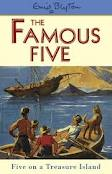
… which are all EXACTLY like The Messenger Bird.
(Okay, okay, so Nathan, Josh and Sasha may have completely different adventures to Julian, George and the gang, but the important point is:)
A Famous Five Story = our heroes on a mission to solve a mystery
The Messenger Bird = our heroes on a mission to solve a mystery
(PLUS they both have a dog in them)
It’s a tried and tested formula for story writing.
(I know MG will appreciate this with her scientific background.)
Cracking codes is pretty much all about solving some kind of mystery, right?
Besides, I’m in love.
RE 4 BP
My love affair with Bletchley Park all started when a friend told me that a mate of her mum used to work there. Before long I was in the company of 85-year-old Beryl, telling me how she signed the Official Secrets Act at 18 and what it was like to work in Hut 7. Before much longer I was heading for Bletchley Park itself.
Now prior to this trip, I’d already goggled at my first Enigma machine at the Imperial War Museum in London. Gazing through the glass case with me was a security systems bloke from the US. Together we were smitten.
His girlfriend looked none too impressed as we chatted geekily about mechanical rotor mechanisms, and it was only after weighing up the statistical probabilities of a three versus a four rotor machine that the two of them (her with a last jealous glare through
the glass) left me to my gogglings.
But wonderful as that was, seeing the Enigma machines in the context of Bletchley Park itself was even more breathtaking than I could ever have imagined. I was hooked.
And by the way,
JOSH GARCIA COULD CRACK THIS NO PROB! (that’s the solution to the code sent by MG, using a cipher introduced to her by Anthony Horowitz)
(6 minutes, 47 seconds)
(But I’m worried to admit, a clever friend helped me.)
And for those of you collecting letters for Ruth’s mystery message competition:
Ruth Eastham’s Messenger Bird blog tour.
MYSTERY LETTER NUMBER 5 = I
Ruth Eastham’s facebook author page
Follow Ruth Eastham on Twitter: @RuthEastham
Thank you Ruth, for taking the time to drop by The MG Harris Blog!
May 14, 2012
Yet more (pointless?) predictions about the future of publishing
 They’re everywhere, these days, pointless predictions about the future of publishing. Pointless because the reality of the future will be dictated by a technology that no-one has yet foreseen, far less anyone in publishing. Why not anyone in publishing? Well, mainly for one reasons And it isn’t that publishing is full of nitwits (because it is not.)
They’re everywhere, these days, pointless predictions about the future of publishing. Pointless because the reality of the future will be dictated by a technology that no-one has yet foreseen, far less anyone in publishing. Why not anyone in publishing? Well, mainly for one reasons And it isn’t that publishing is full of nitwits (because it is not.)
The publishing industry is based on a business model that may well be out-dated – the scarcity model. (Gabriel Garcia Marquez, Agatha Christie and Junot Diaz and assorted literary masters, etc have few equals on the planet, therefore those who control access to their works – publishers – control the market).
It is not this factor per se, which makes it unlikely that a technological innovation is coming from within this community.
It’s that when your business gives you a particular mindset, developing anything that depends on having a radically different one is nigh on impossible.
I used to work in the information business. (Here’s a paper I gave at ONLINE 1998.) There were conferences galore with sessions about the future of the information business.
Ha. No-one got it right. Some kind of inter-library global information network was the future. Then it was CD-ROMs. Then it was the Internet and paid access to private databases. Then it was intelligent agents.
Here’s what I rarely heard about: ebooks, e-readers, tablets, apps, social networking. And this was only TEN years ago.
For this reason, take a massive pinch of salt before you believe anything that anyone predicts about the future of publishing. This is an industry which did not invent or finance the development of the Internet, Facebook, the first apps or the first e-reader. (Amazon is a new player in publishing. They are fundamentally a technology and logistics company.) Massive mistakes have been made by HUGE decision-makers. I present m’learned friends with the example of Rupert Murdoch, he of media mogulness. I point at the glaring errors of his purchase and subsequent development of Pointcast and MySpace.
That said, I’ll have a go at this game myself. Why not? (Sam Missingham @samatlounge recently tweeted ”If I had a penny for every ‘the future of publishing’ article ever written, I’d be coining it in.” Sorry Sam, here’s another and still no coin.)
I too haven’t ever personally developed any innovative information technology and I work in publishing, which makes me brilliantly qualified to gaze into my own crystal ball.
The number of self-published novels is going to soar. This sector within the industry, leaner in costs than any publisher can hope to be, is already providing significant competition. When (to date) over 140 authors have sold over 50,000 ebooks, that is major. It begins to chew rather convincingly into the midlist. Therefore…
The midlist will go. (You don’t say, MG.) Yes, it’s been said before, by Seth Godin and other soothsayers of the publishing tribe. This is no longer soothsaying. It’s happening. The word on the street, in the coffee bars where authors meet, is that advances are lower; in many cases so low that the author can’t afford to keep writing for a living. This is basically the midlist author being told to kindly go away.
(Btw I have no problem with this at all. It is basic business sense. As Nicola Morgan reminds us, publishers are in it to make money. Enough money to pay their salaries. We all have to make a living. Nothing wrong with making a living selling rewritten fan fiction, Pulitzer prize winning fiction and celebrity memoirs, if that is what people want to read.)
The midlist will migrate to self-publishing, or as I believe it may soon be called, micro-publishing. Sales of 10,000 copies (a respectable midlist sales level for the UK territory) could realistically translate to a gross income of $10,000. In this sector, the overheads will be stripped to the bone.
The intellectual property – i.e. the content – will be free. This is the authors stake in the business.
Editing will be by freelance editors, perhaps even cooperatives of authors working for credits within the organisation, to trade against having their own work edited.
Jacket design will also be via freelancers. Hurray for this, because the graphic designers have often had a rum deal by their agencies. They already rely on freelance work. Some co-ops/micro-publishers may even retain freelance designers.
Marketing will be left to the author. It practically is anyway, to which traditionally-published author after author will attest.
Print won’t go away. Many people love a paper book. Createspace may well take over the entire micro or self-publishing sector for print. As a recent user of their service I have been blown away by the ease and efficiency of this service. The minute that CS set up in the UK and Australia, their main competitor, Lightning Source, may have to forget about the self/micro-publishing sector and concentrate on printing books for traditional publishing. Createspace and Lightning Source allow authors to print and distribute books at a price which both competes with traditionally-published books in the marketplace, and give the author slightly more royalty than they’d get via a standard book deal.
Traditional publishers will have to spend ever more on marketing, to compete with the self-published books, which in electronic version at least will be substantially cheaper. An increasing number of books in this sector will be authored by the very authors they developed and then discarded. At that moment, the self/micro publishing sector will no longer imply ‘amateurish’ but ‘books by authors who typically sell fewer than 10,000 copies, but could be very good indeed’.
These bigger marketing budgets will force traditionally-published authors to be instant hits. The debut author will begin to feel like a football player taking a series of penalties at a high-stakes game, having to score a goal with every shot, or risk elimination from the game.
The guaranteed big-hitting authors will realize how profits from their sales are increasingly being used to subsidize the development of new talent which can have only one role to the business – to usurp them. What will they do? First they’ll have their agents hike up their percentage royalties. If your books are making millions, you might feel that a bit more than 10% of that should come your way.
The swollen mid-list will be joined each year by those eliminated from the latest round of penalty kicks. They’ll have homes (micro-publishers) to go to and fans to read their books. Yet more competition. By now, consumers may hesitate to may more than $3 for a ebook, especially since all more and more of their favourite authors are available in this form and at this price.
At some stage, traditional publishers will start to introduce more onerous (e.g. post publication) non-compete clauses into their contracts, to stop an author walking away and becoming the competition. Agents may well collude, because otherwise they too will see their own share of the royalty walk away.
At this point any debut author has entered a truly high-stakes game, where they literally bet their future on the publisher’s promise to make them a hit. But debut authors are often relatively naive, having spent most of their time and energy learning how to write a great book. They probably won’t be able to make an honest assessment of the likelihood of those promises being kept.
Some debut authors will be badly burned and may lash out. Their stories may put other authors off trying the traditional publishing route. The burn-rate would have to be bad and the lashing out vehement, because the need for the kind of validation which a traditionally-published book can provide is strong.
Debut authors who enter via self-publishing, on the other hand, will be posting self-publishing success stories, or nothing at all. Since expectations are so low, there won’t be many bitter, angry burn-outs.
This may make self-publishing the most attractive route for new authors. A publishing professional said to me recently ‘I don’t know why new authors bother with agents or publishers now’. (major aside – Mind you, the elderly Sir Edward Abrahams, part of the award-winning that developed penicillin as a drug, and the multi-millionaire developer of the cephalosporin class of antibiotics once told me that he couldn’t see why young people did PhDs any more, since science had become such a rubbish career. And people are still enrolling in PhD programs. Sometimes folk become disillusioned. Doesn’t mean it is over for everyone.)
The new route to traditional fiction publishing could be this: you self-publish a book, it sells well and gains critical acclaim on Goodreads or Amazon. At this point you approach an agent or possibly, they approach you (as happened to Amanda Hocking and EL James). Or conceivably, the micro-publisher itself starts to act as an agent, directly selling rights to foreign publishers and traditional publishers who promise to big up their author’s books.
Unless you are celebrity, in which case, you can write what you like and it will be published. Regular Jo authors shouldn’t envy celebrities this – these people have done whatever it is they have done to become famous, now they are reaping the fringe benefits. If this is the route you desire, then become a movie star or pop star. No point griping that some folk want to read what Justin Bieber has to say rather than what you have to say.
The slush pile will vanish, the midlist will vanish, and fewer books will be traditionally published, but those which are will receive greater marketing funds
Advances will go but royalties will increase.
If Dan Brown, John Grisham, JK Rowling, Lee Child and all the other multi-million selling authors each decide to hire their own editor, publicist and sales person, and start selling their books at a price which would compete with the new, cheaper midlist books, then the big publishers may well collapse. If I worked for their publishers I would be instructing the levels of loveliness around such authors to go up by a significant notch.
There are probably some readers laughing and thinking, tell me something I don’t already know, genius.
Because this is already happening. In 2011, the high profile debuts were “The Emerald Atlas” and “The Midnight Circus” – two manuscripts that were discovered and sold by agents. (Well maybe not the former, which was written by the screenwriter of a top TV show, but basically, it was the usual route.) In 2012, the high-profile books had already sold millions – as self-published ebooks by authors Amanda Hocking and E.L. James.
Yes, we can tell ourselves that this is temporary, that once the novelty of a self-published book being successful wears off, the media will stop writing articles about them.
But that belies a fundamental truth about what how media of any kind succeeds – people like to read/watch that which lots of other people read or watch. It doesn’t matter if what everybody reads or watches is not of the highest quality available. What people crave is a shared experience.
Amanda Hocking and E.L James demonstrated that you don’t need a costly marketing campaign to sell a million ebooks. Of course, a costly marketing campaign helps. But there isn’t going to be cash for every book to be heavily marketed. And crucially – many of these costly campaigns are going to fail.
Well, hey. Remember what I said at the top of this post. I am a mere author. I’ve been part of the publishing industry for less than five years. The track record predicts that I can’t predict anything.
May 5, 2012
theMGHARRIS.com gets a makeover!

The new face of theMGHARRIS.com
I was rather fond of the adventurous theme of the original design for THEMGHARRIS.COM (see the bottom of this post). But a new, post-Joshua era calls for a new design. The new THEMGHARRIS.COM has cool new things like a slider to showcase important news, and a mini-features section.
The forum, however, is no more. Lately Joshua readers have tended to have discussions on The Official Joshua Files facebook group (which you need to ask to join), or The Joshua Files facebook page (hit LIKE and you’ve joined!)
Also, I haven’t transferred every single news story. If you were ever featured in a story, maybe for winning a competition, then I hope you don’t mind if that story doesn’t appear in the new version. If you do mind, put a comment here and I’ll see about recreating the article!
Take a few minutes to look around! You’ll see that I’m already starting to flag up my soon-to-be-published new book, THE DESCENDANT, especially this announcement:
Coming soon – win a Kindle!
Stay tuned for the launch of THE DESCENDANT facebook page, which will be the focus of an exciting new competition to win a Kindle.
Finally, here’s what the original site looked like. Bye bye!
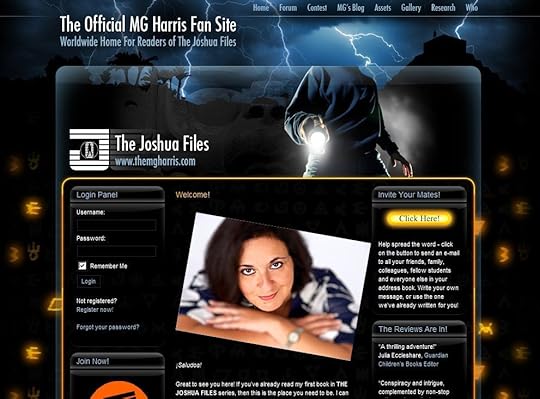
The original face of theMGHARRIS.com
April 5, 2012
Apocalypse Moon has landed!
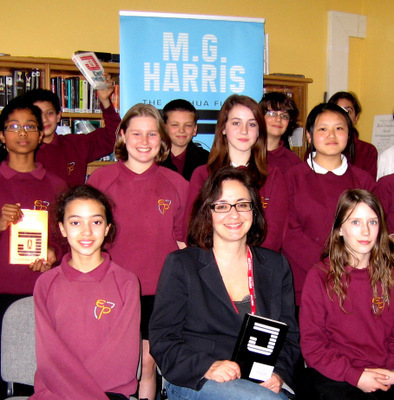
With Yr 7 students at Elthorne High
So the day finally rolled around – the day that Josh Garcia's 2012 adventures come to an end. APOCALYPSE MOON, the final instalment, is published today. for the past two weeks, I've been showing its sleek black coat to children in schools.
Everywhere I go, I get the same 'oooh, cool!' reaction and the question – "Will you write more stories about Josh?"
I'm making no promises. . . But you never know. Those who've already read the finale will know that it's not beyond the realm of possibility that Josh might have more adventures in store. Let's see if any of them come to me!
You can now order APOCALYPSE MOON from Amazon.co.uk or The Book Depository (free worldwide delivery!)
Many, many thanks to St Gregory the Great School and Oxford High in Oxford for hosting the official launch events of APOCALYPSE MOON and to Mark Thornton of Mostly Books for being with me that day and for his absolutely lovely write-up of APOCALYPSE MOON on the Mostly Books blog.
Thanks also to Elthorne Park High School and St John's Primary, Banbury for inviting me for slightly postponed World Book Day celebrations.
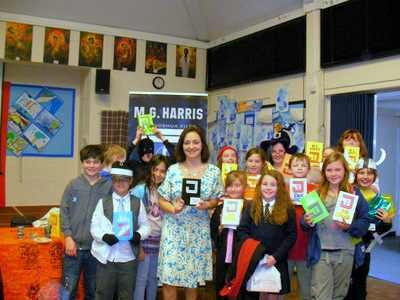
With Yr6 at St John's, Banbury
I'm delighted that Lovereading4kids, who've been consistent supporters of THE JOSHUA FILES have made me the Featured Author of the Month. Here's the lovereading4kids entry for APOCALYPSE MOON.
A few reviews of APOCALYPSE MOON have already appeared, all of which manage to express enthusiasm without revealing any spoilers, which can't have been easy!
The BookZone's review of APOCALYPSE MOON.
The Bookbag review of APOCALYPSE MOON.
Thanks very much especially to readers who've reviewed APOCALYPSE MOON on Goodreads and Amazon. Keep 'em coming! (Unless you didn't like it. Then keep it to yourself!).
It means a great deal to me that you all seem to be enjoying the finale so much. I really wanted to leave you satisfied and hopefully, happy.
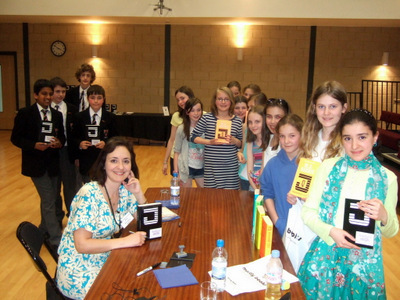
With Oxford High and New College School
Meanwhile the poll to decide what song Josh Garcia records next on his video blog has a couple of days still to run. You can vote here, (see the sidebar to the right), or at fb.com/joshuafiles
And over at the Official Joshua Files Facebook Group, we're discussing ideas for a final big competition to win rare, neon-PVC sleeved copies of the winner's choice of any of the five books. This could be your chance to finally complete your collection! I'll announce the competition at the end of the Easter holidays, over at themgharris.com
Meanwhile, there are still a few more Joshua-related events coming up. All five books should be available as ebooks soon (really! Honest!). The hotly-anticipated Gramedia (Indonesia) edition of DARK PARALLEL will be out soon. And in the USA, Catalonia, Turkey and Vietnam, this will be the year of ZERO MOMENT.
And guess what. . . there is still one untold story from the world of THE JOSHUA FILES.
It's the very first one I wrote – before I realised that Josh had a part to play. The first book I wrote when I was laid up with my broken leg and finished in two months, only to realise that another story was breaking out – the story of a teenage boy in search of a lost Mayan codex. I set that manuscript aside to concentrate on telling Josh Garcia's story.
But if you have a yen for yet another thriller that plunges you into a world of ancient civilisations, secret societies, genetic manipulation and global conspiracy, you might like to meet my very first action heroes, the Bennett brothers, Jackson and Connor.
First though – read APOCALYPSE MOON! Find out how it all ends! Post online reviews! Tell your friends! Enter the competitions!


